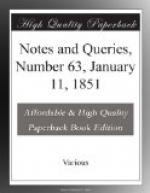He testifies that once, on his voyage through the Arctic regions, lat. ***, long. ***, the cold was so intense, that for a while whatever was spoken on board the vessel became frost-bound, and remained so, till, after certain days, there came a sudden thaw, which let loose the whole rabblement of sounds and syllables that had been accumulating during the suspense of audible speech; but now fell clattering down like hailstones about the ears of the crew, not less to their annoyance than the embargo had been to their dismay. Among the unlucky revelations at this denouement, the author gravely states that a rude fellow (the boatswain, I think), having cursed the knight himself in a fit of passion, his sin then found him out, and was promptly visited by retributive justice, in the form of a sound flogging. If this salutary moral of the fable be not proof sufficient to authenticate both the fact in natural history, and the veracity of the narrator, I know nothing in the world of evidence that could do so. It may be added, that the author of Hudibras, in his significant manner, alludes to the popular belief of such an atmospheric phenomenon in the following couplet:
“Where Truth in person doth
appear,
Like words congeal’d in northern air.”
Hudibras, Book i. Canto
i.
It is possible that Zachary Grey, in his copiously illustrated edition of the poem, may have quoted Sir John Mandeville’s account of this notable adventure, in his wanderings, like a true knight-errant, through Scythia, Armenia, Egypt, Arabia, Syria, Media, Persia, Chaldea, Greece, Dalmatia, Belgium, &c. He wrote an Itinerary of his travels in English, French, and Latin. In these he occupied nearly forty years, and was long supposed to have died in the course of them, but (as if his person had been “congealed in northern air” and suddenly thawed into warm life again) when he re-appeared, his friends with difficulty recognised him.
J.M.G.
Hallamshire.
* * * * *
DOMINICALS
(Vol. ii., p 154.)
I believe to have been that kind of customary payment or oblations made on Sundays to the rector, or his vicegerent, of the church where a person heard divine service and received the sacraments:
“Hostiensis dicit quod in praecipuis festivitatibus tenetur quis offerre, et cogi potest; maxime cum sit quasi generalis consuetudo ubique terrarum ... et intelligit festivitates praecipuas, dies Dominicos, et alios dies festivos.”—Lyndwood, Prov., p. 21., not. e., ed. Oxon. 1679.
Though Lyndwood himself, as I understand him, seems to doubt the cardinal’s statement, that the payment could be enforced, unless sanctioned by local custom.
Ducange, in v. “Denarius,” 8vo. ed., Adel. 1774, says, the “Denarius de Palma” and “Denarius Dominicalis” were the same:




